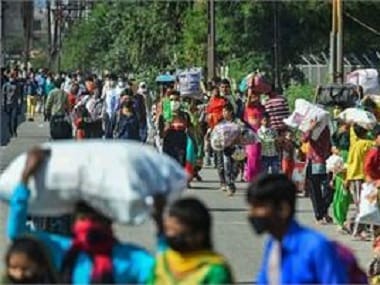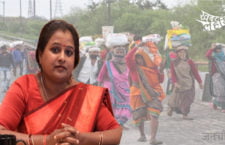A nation of over 522 million workers will celebrate International Worker’s Day or Antarashtriya Mazdoor Diwas today. Historically, Labour Day or International Workers’ Day commemorates worker solidarity, the dignity of labour, and the rights of workers to organise and be treated with respect.
However, on its 97th Labor Day, the nation is reeling from the onslaught of the nationwide coronavirus lockdown that has pulled the ground from under the feet of its labour force; dignity, solidarity, and respect seem like hollow tokens to the migrant labourers of the nation.
The mass exodus of migrant labourers from cities back to their hometowns after the nationwide lockdown was announced on 24 March is the biggest forced migration seen since the Partition in 1947. Labourers made the long journey back to their rural homes, braving sub-standard quarantine facilities, relief camps, and the whims of authority figures.
And yet, even in the midst of the turmoil, it seems they are preparing, even if mentally, to return to the city again if things resume to a more BAU (business as usual) status.
The dusty badlands of Bundelkhand testify.
Usha, a labourer from Mahoba says, “Of course we will go back to Delhi. Wherever we can earn enough to fill our stomachs, we will go. What will we do here, when we don’t have any land or livelihood? There is no work for us here.”
Yahan par rozgaar nahi hai or ‘there is no work here’ has become a common refrain across the region. No employment in Bundelkhand, growing families to feed, extant debt, and inadequate farmlands in their hometowns are cited as common reasons for labourers to migrate to bigger cities. India has roughly 120 million such migrant workers, forming approximately 20 percent of the nation’s workforce.
Bundelkhand alone accounts for 6 lakh returning migrant labourers. These migrant labourers within the informal sector earn barely enough for their subsistence and have no socio-economic safeguards to help them weather untimely crises. They must go back to work if they want a chance at life.
Further, since the inception of the lockdown, unemployment rates in the country have rocketed to over 20 percent in March, turning over 100 million workers out of jobs.
The Centre for Monitoring the Indian Economy has estimated India’s unemployment rate at 29.4 percent in rural areas and at 25 percent in urban areas for the week ended 26 April.
In a report by Bloomberg Quint, Mahesh Vyas, the chief executive officer of CMIE was quoted as saying, “These are very big variations and are subject to the usual sampling errors. It, therefore, may not be very wise to focus on the magnitude of those movements but on the certainty of the movements.”
Consequently, workers are bracing themselves for the long journey back to the cities, here synonymous with sustenance, which unkindly expunged them at the first sign of trouble.
Usha continues, “Our feet swelled up, and we kept walking because stopping was not an option. Everyone was leaving, so we left with them. I was being driven out of my accommodation [in Delhi] and pushed towards staying in another house. How would I be able to afford the expenses–of water, electricity–there? That’s why I left.”
Birbal, a worker from Banda wryly comments, “They can get [Indians in other countries] back from abroad, but they won’t even let us walk home. The people stuck abroad were brought home on aeroplanes, and were provided top-notch facilities. But for us domestic citizens, who belong here with our land–we weren’t provided for.”
“I borrowed from the thekedaar (contractor) here and worked to pay that off. Then I had to borrow again, for my rent, and for food, so that was another debt incurred. Then, I stayed in the school [the quarantine facility] for 14 days and still had to pay my expenses. And so, I’m now heavily in debt; I have almost Rs 10,000 to 15,000 to pay off. Of course, I need to repay my loans! I need to pay the thekedaar, if not today, then tomorrow! He says he is not responsible for the lockdown or the government, and that if he has loaned me some money, then he needs it to be returned.”
While estimates report that any meaningful stimulus would need a minimum of Rs 6 trillion to successfully provide relief to India’s poor and unemployed, the current government stimulus stays at Rs 600 billion, with meagre cash transfer benefits touted as the much-needed support from the Centre.
After the initial lockdown, the Centre mandated that states construct relief camps and quarantine shelters for displaced labourers. However, our previous reportage has highlighted the inhumane conditions of these camps that expose its inmates to further physiological and mental hardships.
As the 3 May deadline for the end of the lockdown approaches, speculation runs rife: Will the lockdown be extended? Will the extension be state-wise or nationwide? How do we return to business as usual when the working populace is suffering insurmountable losses?
Uttar Pradesh is considering further extending the lockdown, given that essential stores and 11 kinds of industries are already being allowed to open in the state after 20 April. However, all further decisions are contingent and subject to change. This much is clear, this Labour Day, the workers of India are fighting for their right to work, and for work as a road back to dignified living.
This story is exclusively co-published with Firstpost
Also Read:
In UP’s Mahoba, migrant labourers’ families say nights sleepless, pockets empty and future uncertain
No food, no water, no money
Migrant workers of rural Uttar Pradesh fight for right to work to ensure dignified living
Return of the migrant
Serpentine queues for Rs 500, endless wait to travel home


